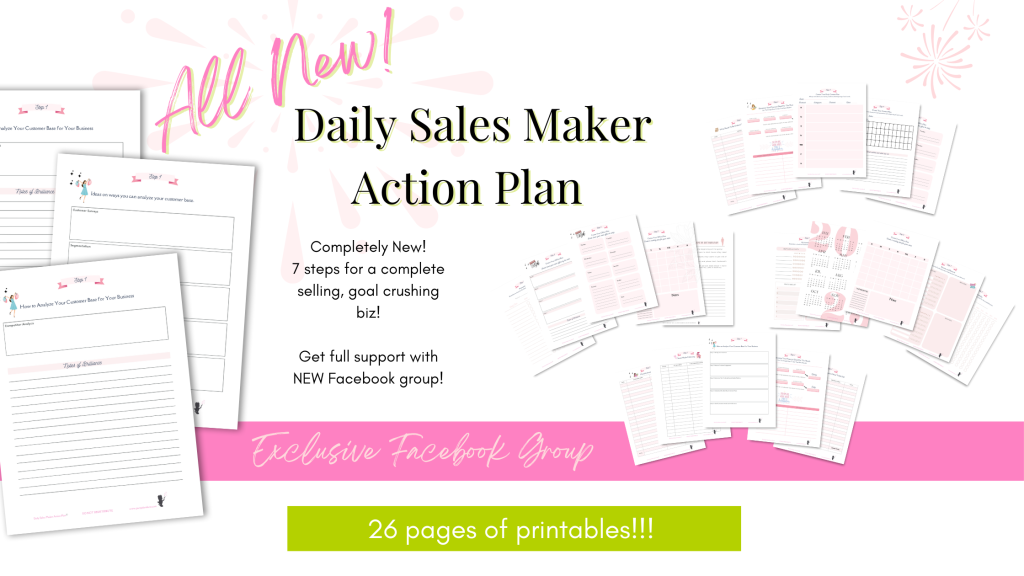Unlocking the Power of Personalized Direct Selling
Direct selling has been around for centuries, and it’s still one of the most effective ways to get your products into customers’ hands. However, in today’s digital world, connecting with potential customers can be tricky. That’s why personalizing your direct selling strategy is key.
By taking a personalized approach to direct selling, you can build meaningful relationships with each customer and forge lasting connections that will help you stand out from the competition. In this blog post, we’ll explore how to use personalized direct selling strategies to create an unforgettable experience for your customers and drive sales growth for your business.
This post may contain affiliate links which means we receive a small commission at no cost to you when you make a purchase. As an Amazon Associate, I earn from qualifying purchases.
What Is The Definition of Personalized Direct Selling
Personalized direct selling is a marketing strategy that focuses on personalizing each customer experience to build meaningful relationships and help drive sales growth for the business.
It involves customizing each interaction with customers to make them feel valued, understanding their individual needs, interests, values and preferences, and building long-term loyalty by providing an unforgettable buying experience.
Personalized direct selling also creates an intimate connection between the brand and its customers so they feel like part of a community rather than just another buyer.
Why Is It Important To Personalize Your Direct Selling
Personalizing your direct selling is important because it helps create a personalized and memorable experience for customers, which makes them feel valued and builds loyalty.
It also helps build an intimate connection between the brand and its customers, so they feel like part of a community rather than just another buyer.
Personalized direct selling can also help increase sales growth for the business by creating a unique buying experience that will stand out from the competition.
By taking a personalized approach to direct selling, businesses can build relationships with their customers that foster strong customer loyalty over time.
Gather Information At Home Parties
Here are some ways a direct seller can gather and keep track of information at home parties to offer their customers a personalized buying experience next time
- Customer surveys: Provide a brief survey to customers to gather information about their preferences, interests, and needs. Include questions about their favorite products, preferred colors, and other relevant information.
- Personal notes: Take personal notes during conversations with customers to keep track of their interests, concerns, and preferences. This information can be used to tailor future recommendations and communication.
- Customer profiles: Create customer profiles or customer relationship management (CRM) software to store customer information such as their contact details, purchase history, and preferences. This information can be accessed later to offer personalized recommendations and deals.
- Social media: Connect with customers on social media platforms like Facebook and Instagram to gather additional information about their interests and preferences. Use this information to personalize your selling approach in the future.
- Follow-up emails: After a home party, send follow-up emails to customers thanking them for their business and asking for feedback on their experience. Use this feedback to improve your service and personalize future interactions with these customers.
By gathering and keeping track of information through these methods, direct sellers can offer their customers a personalized buying experience that can lead to increased customer satisfaction and loyalty.
How to use customer information to personalize your selling approach
Once a direct seller has gathered customer information through methods such as customer surveys, personal notes, customer profiles, social media, and follow-up emails, they can use this information to personalize their selling approach in several ways:
Personalized product recommendations: Based on the customer’s previous purchases and preferences, a direct seller can recommend products that are tailored to their interests and needs. This approach can increase the likelihood of a sale and build customer loyalty.
Personalizing product recommendations is important for direct sellers because it can have a significant impact on their sales. Here are a few reasons why:
- Increases customer satisfaction: Personalizing product recommendations shows customers that the direct seller is paying attention to their needs and preferences. This can make customers feel valued and increase their satisfaction with the buying experience.
- Builds customer loyalty: By tailoring their recommendations to each customer, direct sellers can build stronger relationships with their customers. This can increase customer loyalty and lead to repeat business in the future.
- Boosts sales: When a direct seller recommends products that align with a customer’s interests and needs, they are more likely to make a purchase. Personalized recommendations can also lead to larger purchases as customers feel confident that the recommended products are the best fit for them.
- Generates positive word-of-mouth: When customers are happy with their buying experience, they are more likely to share their positive experience with others. This can lead to new customers and increased sales.
Personalizing product recommendations is important for direct sellers because it can increase customer satisfaction, build loyalty, boost sales, and generate positive word-of-mouth. By taking the time to gather and use customer information, direct sellers can provide a more tailored and effective buying experience for their customers.
Tailored communication: A direct seller can use the information gathered to personalize their communication with the customer. For example, they can use their preferred name or reference their previous conversations to make them feel valued.
Personalizing communication with customers is important for direct sellers for several reasons, including:
- Building trust: Personalizing communication with customers can help build trust between the customer and the direct seller. By using the customer’s name and referencing their previous interactions or purchases, the customer feels acknowledged and valued.
- Creating a positive customer experience: Personalizing communication with customers can create a positive experience for the customer. This can lead to increased customer satisfaction and loyalty.
- Improved customer retention: Personalized communication can help improve customer retention. When customers feel valued and engaged, they are more likely to continue purchasing from the direct seller in the future.
- Increased sales: Personalized communication can also increase sales. When a customer feels that the direct seller understands their needs and preferences, they are more likely to make a purchase.
Overall, personalizing communication with customers is important for direct sellers as it can help build trust, create a positive customer experience, improve customer retention, and increase sales. By using customer information to personalize communication, direct sellers can create a more effective and engaging selling approach.
Targeted promotions: Direct sellers can use the information gathered to offer targeted promotions to customers. For example, if a customer has expressed an interest in a particular product, a direct seller can offer them a special deal or discount on that product.
Targeted promotions can be an effective strategy for direct sellers to increase sales and improve customer engagement. Here are a few reasons why:
- Increases relevance: Targeted promotions are tailored to a specific customer’s interests and preferences, making them more relevant to the customer. This relevance can make the promotion more compelling and increase the likelihood of a purchase.
- Improves customer experience: By offering promotions that are relevant to the customer, direct sellers can improve the customer experience. This can increase customer satisfaction and lead to greater customer loyalty.
- Encourages repeat purchases: Targeted promotions can encourage repeat purchases. When customers receive promotions that align with their interests and needs, they are more likely to make a purchase. This can lead to increased customer retention and repeat business.
- Maximizes marketing budget: By targeting promotions, direct sellers can maximize their marketing budget. Rather than sending promotions to a large audience, which can be costly and less effective, targeted promotions can be sent to a smaller, more engaged audience, leading to a greater return on investment.
Targeting promotions is important for direct sellers as it can increase relevance, improve the customer experience, encourage repeat purchases, and maximize the marketing budget. By using customer data to tailor promotions to specific customers, direct sellers can create a more effective and engaging selling approach, ultimately leading to increased sales.
Relevant content: Direct sellers can create relevant content such as blog posts or social media posts that align with their customer’s interests and preferences. This approach can increase engagement and build brand loyalty.
Showing relevant social media content based on customers’ preferences is important for direct sellers for several reasons:
- Increases engagement: When customers see social media content that is relevant to their interests and preferences, they are more likely to engage with it. This can lead to increased likes, comments, and shares, ultimately expanding the direct seller’s social media reach and potentially attracting new customers.
- Builds relationships: Showing relevant social media content based on customer preferences can help build a relationship between the customer and the direct seller. Customers feel understood and valued when they see content that aligns with their interests and needs, leading to a stronger connection with the direct seller.
- Improves brand loyalty: When customers see social media content that resonates with them, they are more likely to feel loyal to the brand. This can lead to increased customer retention and repeat business.
- Increases sales: By showing relevant social media content based on customer preferences, direct sellers can increase the likelihood of a sale. When customers see content that aligns with their interests and needs, they are more likely to make a purchase.
Showing relevant social media content based on customer preferences is important for direct sellers as it can increase engagement, build relationships, improve brand loyalty, and increase sales. By using customer data to tailor social media content to specific customers, direct sellers can create a more effective and engaging selling approach, ultimately leading to increased sales.
Personalize Direct Selling with the use of technology
There are many clever and beneficial ways that direct sellers can use technology to engage with their customers and personalize their buying experience. Here are a few examples:
- Personalized product recommendations: Direct sellers can use technology to analyze customer data and make personalized product recommendations. This can help customers find products that are relevant to their needs and interests, leading to a more personalized buying experience.
- Virtual try-on tools: Some direct sellers use technology to create virtual try-on tools, allowing customers to see how a product will look on them before making a purchase. This can increase customer confidence and reduce the likelihood of returns.
- Mobile apps: Direct sellers can create mobile apps that allow customers to easily browse products, make purchases, and access personalized recommendations and promotions. This can improve the customer experience and increase engagement.
- Live video streaming: Direct sellers can use live video streaming to engage with customers in real-time, showcasing products, providing demonstrations, and answering questions. This can help build relationships and increase customer trust.
- Chatbots: Direct sellers can use chatbots to provide personalized customer service, answering questions and providing recommendations based on customer data. This can improve the customer experience and increase customer satisfaction.
Technology can be a powerful tool for direct sellers to engage with their customers and personalize their buying experience. By using customer data and leveraging innovative technologies, direct sellers can create a more effective and engaging selling approach, ultimately leading to increased sales and customer loyalty.
Email Marketing Is Paramount To Personalize Direct Selling
Email marketing is a powerful tool for direct sellers to personalize their marketing and boost their sales. Here are some ways direct sellers can use email marketing to achieve these goals:
- Segment your email list: By segmenting your email list based on customer data, such as purchase history and preferences, you can send personalized and relevant content to each customer. This can increase engagement and ultimately lead to more sales.
- Use personalized subject lines and content: Personalized subject lines and content can grab customers’ attention and make them more likely to engage with your email. Use customer data to personalize your messaging and make it more relevant to each recipient.
- Send personalized product recommendations: Use customer data to send personalized product recommendations based on their purchase history and preferences. This can lead to increased sales and customer loyalty.
- Offer personalized promotions: Use customer data to offer personalized promotions and discounts based on their purchase history and preferences. This can incentivize customers to make a purchase and increase customer loyalty.
- Automate your email campaigns: Use automation to send personalized and relevant emails at the right time. For example, you can send a follow-up email after a customer makes a purchase or send a reminder email when a customer abandons their cart.
Email marketing is a powerful tool for direct sellers to personalize their marketing and boost their sales. By using customer data and personalizing your messaging and promotions, you can create a more effective and engaging selling approach, ultimately leading to increased sales and customer loyalty.
Going Back To Basics To Personalize Direct Selling
In today’s digital age, sending physical cards via mail may seem old-fashioned, but it can actually be a highly impactful and personalized way to connect with your customers. Here’s why:
- It shows that you value your customers: By taking the time to send a physical card, you’re showing your customers that you value their business and appreciate their support. This can help to strengthen the relationship between you and your customers, leading to increased loyalty and repeat business.
- It’s a tangible way to connect with customers: Unlike digital communication, physical cards are something that customers can hold in their hands and keep. This creates a more tangible connection between you and your customers, making your business feel more real and personal.
- It can help you stand out from the competition: In a world where digital communication is the norm, sending physical cards can help you stand out from the competition. It’s a unique and unexpected gesture that can help to differentiate your business and make it more memorable to customers.
- It allows for personalization: When you send a physical card, you have the opportunity to personalize it with the customer’s name and a handwritten message. This personal touch can make customers feel valued and appreciated, leading to increased loyalty and positive word-of-mouth referrals.
Sending hello, welcome, and thank you cards via mail can be a highly impactful and personalized way to connect with your customers. It shows that you value their business, creates a tangible connection, helps you stand out from the competition, and allows for personalization. By incorporating this strategy into your direct selling approach, you can create a more effective and engaging selling experience for your customers.
By using customer information to personalize your selling approach, you will build stronger relationships with your customers, increase customer satisfaction, and drive sales.








